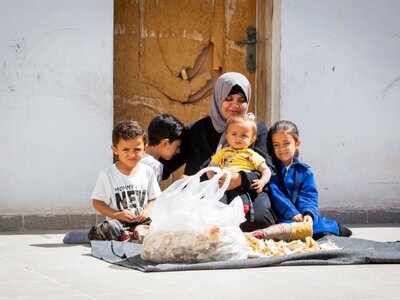Jordan
- 77%
- of refugees in Jordan are food insecure
- 21.3%
- of the population unemployed
- 11.8 million
- population
Jordan is a resource-poor, food-deficit country, with limited agricultural land and increasingly frequent climate-related shocks.
Over the past decade, its economy has remained stagnant and unable to generate sufficient employment.
Jordan hosts the second-largest number of refugees per capita worldwide. As of June 2025, over 586,600 refugees were registered with UNHCR, 81 percent of whom were living within communities and 19 percent in the Zaatari and Azraq refugee camps.
These refugees experience worrying levels of food insecurity, while the numbers add unprecedented pressure on Jordan’s budget, natural resources, infrastructure and labour market.
The World Food Programme’s support includes food assistance for vulnerable refugees, technical assistance for the government’s national social protection programmes and expanding climate action.
What the World Food Programme is doing in Jordan
-
Refugee response
-
WFP’s response is centred around two pillars: a humanitarian response to address the immediate needs of refugees, and a transformational one to address the structural obstacles hampering refugees’ food security. Through cash-based transfers, WFP provides monthly assistance to vulnerable refugees, primarily Syrians, both in and out of camps, helping them to meet their essential food needs. WFP works with UNHCR to foster the economic participation of refugees in becoming self-reliant, while continuing to address their imminent needs.
-
Social protection
-
School meals
-
Climate action
-
Food security governance
Jordan news releases
Go to pagePartners and donors
Find out more about the state of food security in Jordan
Visit the food security analysis pageOperations in Jordan
Contacts
Office
Al-Jubaiha, Rasheed District, 79 Al-Wefaq Street, P.O.Box: 930727, Amman 11193, Jordan.
Amman
Jordan







